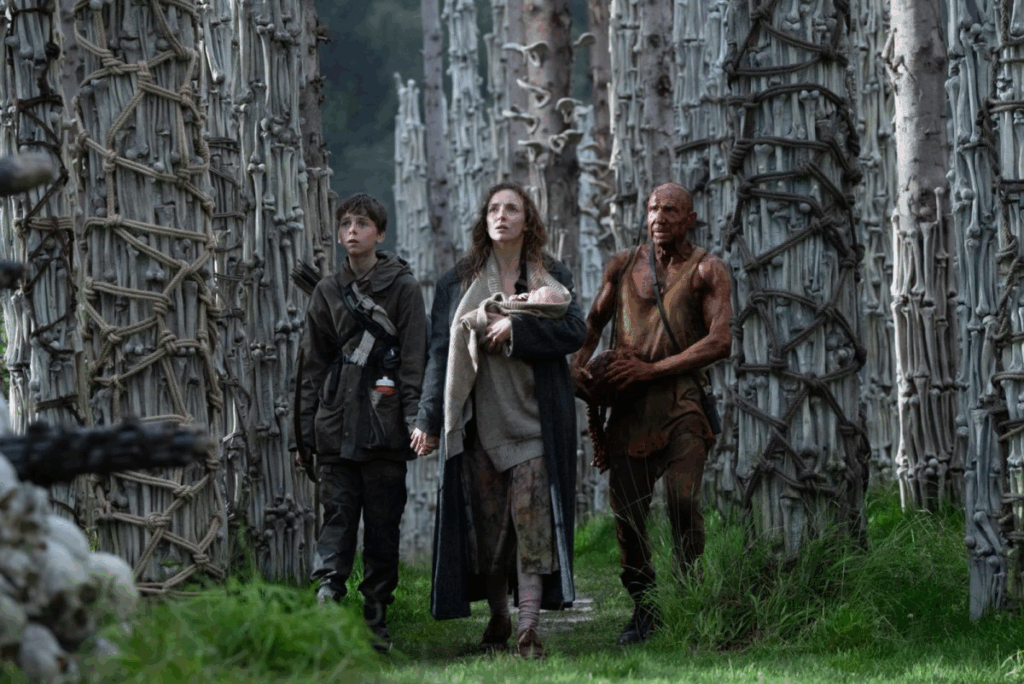The much-anticipated sequel, 28 Years Later, sees the reunion of director Danny Boyle and screenwriter Alex Garland, taking audiences back into a chillingly familiar post-apocalyptic world. Set decades after the events of the groundbreaking 2002 film, the new installment weaves together an array of genres—zombie horror, medieval aesthetics, and a poignant family narrative—crafting an engaging yet complex tapestry. Visuals burst with Boyle’s signature style, and Ralph Fiennes delivers a captivating performance that adds depth to the storyline, stepping into the role of a madman lurking in the sinister heart of the woods, while Aaron Taylor-Johnson and Jodie Comer anchor the film with their compelling portrayals of survival in a desolate landscape. The film often evokes comparisons to modern narratives like The Last of Us, as it traverses themes of familial bonds amidst terror and moral dilemmas.
However, despite the film’s impressive visual execution and gripping moments, there are noticeable inconsistencies in the merging of its ideologies. Garland’s sharp political commentary, aiming to resonate with contemporary issues of isolationism, feels at odds with Boyle’s more commercially driven filmmaking. This disconnect causes the narrative to falter, especially with characters like Spike, who lacks depth and substance, rendering certain emotional threads less impactful. As the story unfolds against a backdrop of grisly encounters with creatures evolved from the original virus’s rage-induced victims, the innovative take on past horror tropes occasionally stumbles into absurdity, particularly in the handling of the infected pregnant woman twist. While 28 Years Later remains a visually stunning endeavor, capturing the raw horror of its predecessors, it ultimately showcases the struggle of balancing ambitious storytelling with blockbuster expectations.
A Visually Striking Sequel
The much-anticipated sequel, ’28 Years Later,’ directed by Danny Boyle, is visually captivating. Boyle’s signature style is evident throughout the film, making each frame an art piece. Critics have noted that the cinematography expertly captures the desolate landscapes of a post-apocalyptic world, enhancing the viewer’s immersion into the haunting atmosphere.
Ralph Fiennes delivers a powerhouse performance that reportedly becomes the emotional anchor of the narrative. His character’s dramatic entrance revitalizes the plot halfway through, as he embodies the film’s themes of survival and madness. His portrayal adds depth to the chaotic world that Boyle and co-director Alex Garland have crafted.
While the visuals are stunning, some concerns have been raised about the film’s pacing and coherence. Despite the compelling imagery, certain critics feel that the storyline’s execution fails to completely connect the powerful visuals with an equally engaging script. As Caryn James puts it, the film is “never dull but not as fully engaging as it might have been.”
Character Dynamics and Thematic Depth
Central to the narrative is Jamie, played by Aaron Taylor-Johnson, who faces the harsh realities of parenthood in a ravaged world. His role involves teaching his son Spike the grim necessities of survival, making for a tense father-son dynamic. This foundation provides a layer of emotional gravitas as they navigate a dangerous landscape.
However, some narrative elements have drawn criticism for lacking depth. Spike’s character, in particular, has been described as bland and unremarkable. Critics suggest that the film’s attempt to weave in family themes might not resonate fully with viewers, resulting in a disjointed emotional impact.
The film’s political undertones, reminiscent of contemporary issues like isolationism, are introduced but not deeply explored. The screenplay hints at a quarantine theme, suggesting deeper societal reflections; however, many viewers might find these threads unsatisfactorily resolved. This leaves the audience with more questions than answers about the state of humanity in this dystopian setting.



More Stories
Itumeleng Khune Celebrates His 38th at Clash of Legends
Roberto Calvi Murder: Unraveling the Dark Intrigue
Best Books of 2025: Top 12 Must-Read Novels So Far